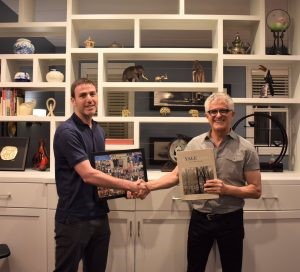Inspired by the potassium channel in cells: The future of ion-selective synthetic membranes is vast
A Nature Nanotechnology perspective piece on ion-specific membranes highlights their importance and “paves pathways for new research avenues.”
Read the full article
Visit the website of the new lab
A Nature Nanotechnology perspective piece by new Technion Asst. Prof. Razi Epsztein from the Faculty of Civil and Environmental Engineering and his postdoc mentor, Prof. Menachem Elimelech from Yale University, highlights the future of synthetic membranes – used widely in desalination, among other technologies. Specifically, the focus is on the future fabrication of membranes with tiny (sub-nanoscale) pores that possess the ability to selectively distinguish between specific ions in water – even extremely similar ones, such as sodium and potassium.
Currently, membrane technology is predominantly used in reverse osmosis desalination – an energy efficient way to ideally remove all salts from water. However, reverse osmosis and other types of synthetic membranes lack the ability to discriminate between ions, resulting, for example, in the redundant step of re-adding the ions that are necessary for safe drinking water. Moreover, the waste, or brine, resulting from current unselective desalination is an environmental concern.
Based on the Potassium channel found in cells, synthetic ion-selective membranes take their inspiration from nature’s ingenuity. Such ion-selective technology would pave the way for: membranes that can be used to remove a contaminant from groundwater leaving the ‘good’ ions behind; membranes with the ability to mine important elements from water such as Lithium – a valuable resource for batteries in our wireless world; a method to pretreat and remove calcium and magnesium from seawater, before desalination, to reduce scale buildup, which shortens the lifespan of reverse osmosis membranes; filtering or sensing target compounds in medicine; and much more.
Prof. Epsztein emphasizes the potential of ion-selective membranes: “Selectivity is fascinating and important at the same time. Improving our ability to discriminate and separate between small ions and molecules can be super beneficial for water-treatment processes, as well as for resource recovery, energy production, sensing, and even medicine.”
Prof. Epsztein’s lab will focus on the development of “selective separation technologies for a wide range of environmental applications, with a focus on membrane technologies at the water-energy nexus.” This will entail the fundamental study of transport in polymeric (organic) membranes and advanced materials followed by the fabrication of selective membranes for various applications that require high selectivity.



